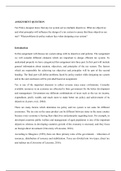ASSIGNMENT QUESTION
Tax Policy designer know that any tax system serves multiple objectives. What are objectives
and what principles will influence the design of a tax system to ensure that these objectives are
met? What problems do policy makers face when designing a tax system?
Introduction
In this assignment will discuss tax system along with its objectives and policies. The assignment
we will consider different elements which are important to design efficient tax system. To
understand properly we have categorized this assignment into three part. In first part will include
general information about taxation, objectives, and principles of the tax system. The factors
which are responsible for achieving tax objectives and principles will be part of the second
heading. The final part will define problems faced by policy marker while designing tax system
and at the end conclusion will be provided based on assignment.
Tax is one of the important elements to collect revenue since many civilizations. Currently
available resources in an economy are allocated to their government for the better development
and management. Government use different combinations of taxes such as the tax on income,
expenditure, profit, wealth, and much more to make better tax policy and achievement of its
objectives (Lymer, et al., 2004).
There are many factors which determine tax policy and tax system is not same for different
economies. The tax rate on the same product can be different between states in the same country
because every economy is having their objectives and principles regarding taxes. For example, in
developed countries public welfare and management of aged population is one of the important
objectives whereas in developing countries growth of the economy is necessary and they focus
on foreign direct investment (University of Leicester, 2016).
According to Musgrave (1959), there are three primary roles of the government – Allocation of
resources, distribution of resource and stabilization. Taxes are divided into two types, direct tax
and indirect tax (University of Leicester, 2016).
, Direct Tax – Taxes which can directly levy on the taxpayers are direct taxes. Taxpayers directly
pay to the government and it cannot be transferred from one taxpayer to another. Some of the
direct tax examples are council tax, income tax, national insurance tax, and corporate tax.
Indirect Tax – Taxes which are indirectly collected by the government from the people's
spending and consumption. The increase in indirect tax affect directly to the product price and
also the behavior of the buyers. Some of the indirect taxes are VAT, GST, excise duty and
landfill tax.
As we have explained above, that every economy is having tax different policies and it is not
easy to analysis all the tax policies. For better understand we are selecting OECD countries to
view and in depth UK economy for the overall conclusion of the assignment.
Roles of Government
The Allocation Role of Government: When individuals are unable to manage collective
development than government plays an important role and government allocates belongings as
per different rights of the property. For an example, there are rights for the property which define
ownership belonging to the individual or shared. Shared property right work where scarcity of
resource is not exit and price is controlled by marginal utility. According to Brown & Jackson
(1990), allocation and distribution of resources are the main roles of the government, and it
should have allocated between individuals and shared based on the requirements and rights.
The Distributive Role of Government: The Distributive Role of Government: Due to the central
authority government is in the better position to collect and distribute resources and income into
individuals, group and other welfare activities of the county. Resources distribution such as
wealth relies on the right to inherited revenue whereas the distribution of income is based on the
skills, growth, and exercise of individuals (Brown & Jackson, 1990).
The Regulatory Role of Government: It is necessary to regulate and control economy from
different activities such as monopoly conditions, rights of buyers and manufacturers and other
externalities conditions. To control all these activities, government is responsible. Still there are




